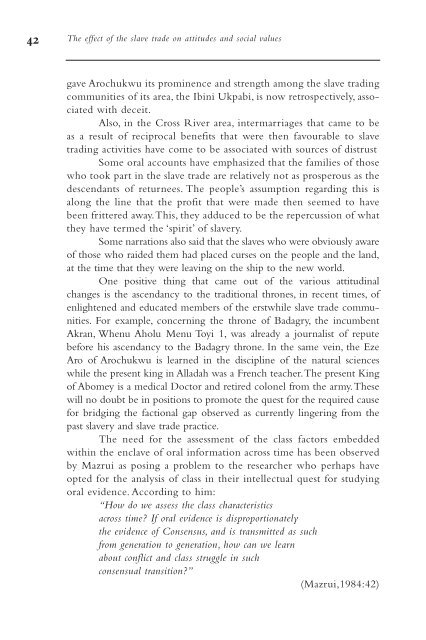Oral tradition relating to slavery and slave trade in Nigeria, Ghana ...
Oral tradition relating to slavery and slave trade in Nigeria, Ghana ...
Oral tradition relating to slavery and slave trade in Nigeria, Ghana ...
You also want an ePaper? Increase the reach of your titles
YUMPU automatically turns print PDFs into web optimized ePapers that Google loves.
42<br />
The effect of the <strong>slave</strong> <strong>trade</strong> on attitudes <strong>and</strong> social values<br />
gave Arochukwu its prom<strong>in</strong>ence <strong>and</strong> strength among the <strong>slave</strong> trad<strong>in</strong>g<br />
communities of its area, the Ib<strong>in</strong>i Ukpabi, is now retrospectively, associated<br />
with deceit.<br />
Also, <strong>in</strong> the Cross River area, <strong>in</strong>termarriages that came <strong>to</strong> be<br />
as a result of reciprocal benefits that were then favourable <strong>to</strong> <strong>slave</strong><br />
trad<strong>in</strong>g activities have come <strong>to</strong> be associated with sources of distrust<br />
Some oral accounts have emphasized that the families of those<br />
who <strong>to</strong>ok part <strong>in</strong> the <strong>slave</strong> <strong>trade</strong> are relatively not as prosperous as the<br />
descendants of returnees. The people’s assumption regard<strong>in</strong>g this is<br />
along the l<strong>in</strong>e that the profit that were made then seemed <strong>to</strong> have<br />
been frittered away.This, they adduced <strong>to</strong> be the repercussion of what<br />
they have termed the ‘spirit’ of <strong><strong>slave</strong>ry</strong>.<br />
Some narrations also said that the <strong>slave</strong>s who were obviously aware<br />
of those who raided them had placed curses on the people <strong>and</strong> the l<strong>and</strong>,<br />
at the time that they were leav<strong>in</strong>g on the ship <strong>to</strong> the new world.<br />
One positive th<strong>in</strong>g that came out of the various attitud<strong>in</strong>al<br />
changes is the ascendancy <strong>to</strong> the <strong>tradition</strong>al thrones, <strong>in</strong> recent times, of<br />
enlightened <strong>and</strong> educated members of the erstwhile <strong>slave</strong> <strong>trade</strong> communities.<br />
For example, concern<strong>in</strong>g the throne of Badagry, the <strong>in</strong>cumbent<br />
Akran, Whenu Aholu Menu Toyi 1, was already a journalist of repute<br />
before his ascendancy <strong>to</strong> the Badagry throne. In the same ve<strong>in</strong>, the Eze<br />
Aro of Arochukwu is learned <strong>in</strong> the discipl<strong>in</strong>e of the natural sciences<br />
while the present k<strong>in</strong>g <strong>in</strong> Alladah was a French teacher.The present K<strong>in</strong>g<br />
of Abomey is a medical Doc<strong>to</strong>r <strong>and</strong> retired colonel from the army.These<br />
will no doubt be <strong>in</strong> positions <strong>to</strong> promote the quest for the required cause<br />
for bridg<strong>in</strong>g the factional gap observed as currently l<strong>in</strong>ger<strong>in</strong>g from the<br />
past <strong><strong>slave</strong>ry</strong> <strong>and</strong> <strong>slave</strong> <strong>trade</strong> practice.<br />
The need for the assessment of the class fac<strong>to</strong>rs embedded<br />
with<strong>in</strong> the enclave of oral <strong>in</strong>formation across time has been observed<br />
by Mazrui as pos<strong>in</strong>g a problem <strong>to</strong> the researcher who perhaps have<br />
opted for the analysis of class <strong>in</strong> their <strong>in</strong>tellectual quest for study<strong>in</strong>g<br />
oral evidence. Accord<strong>in</strong>g <strong>to</strong> him:<br />
“How do we assess the class characteristics<br />
across time? If oral evidence is disproportionately<br />
the evidence of Consensus, <strong>and</strong> is transmitted as such<br />
from generation <strong>to</strong> generation, how can we learn<br />
about conflict <strong>and</strong> class struggle <strong>in</strong> such<br />
consensual transition?”<br />
(Mazrui,1984:42)


